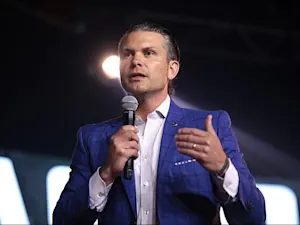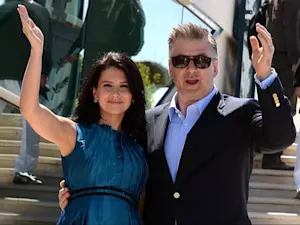
Epstein Emails Rock Harvard
Former U.S. Treasury Secretary Larry Summers speaking at the 2025 Dialogues for Democracy at the Rob and Melani Walton Center for Planetary Health in Tempe, Arizona. Photo courtesy of Gage Skidmore under CC BY-SA 2.0.
Larry Summers, a towering figure in economics and former president of Harvard University, recently faced a moment few academics would envy. In November 2025, he reportedly opened his economics lecture at Harvard with an apology — not for a miscalculation or a controversial theory, but for his long-standing correspondence with the disgraced financier Jeffrey Epstein. Despite the scandal and the public outcry it ignited, Summers told his students he intended to continue teaching, asking for their permission to "go forward" with the class, as reported by PEOPLE.
The Scandal Unfolds: Who, What, Where, and When
The backdrop to this unusual classroom moment is a trove of emails released by the House Oversight Committee in late 2025. These documents reportedly revealed that Summers had maintained contact with Epstein for years, including exchanges as recent as the day before Epstein's arrest on federal sex trafficking of minors charges in July 2019. The emails apprently showed Summers seeking romantic advice from Epstein and lamenting the professional consequences of "cancel culture," particularly regarding interactions with women, as reported by PEOPLE.
Summers' apology came amid mounting pressure from students, faculty, and public figures. Senator Elizabeth Warren, among others, reportedly called for Harvard to take swift action to remove Summers from teaching roles, citing concerns about trust and the safety of the academic environment. Warren told the Globe, "Larry Summers has demonstrated that he cannot be trusted. Period. That includes no trust for the advice he gives or for teaching students anywhere," as reported by PEOPLE. "It's not just about Harvard, it's about any place. Larry Summers has demonstrated how unfit he is for positions of trust, and that applies to corporate boards, universities and policy makers."
Harvard itself announced it would open a new investigation into the ties between Epstein and university affiliates, including Summers.
A Classroom Confrontation: Apology Meets Academia
In a video that quickly went viral, Summers can be seen addressing his students in "The Political Economy of Globalization," an elective course at Harvard. "I just want to say before we start that it's not easy for me to be here," he said to a lecture hall full of economics students, as reported by The Daily Beast. "Some of you will have seen my statement of regret, expressing my shame with respect to what I did in communication with Mr. Epstein, and that I've said that I'm going to step back from public activities. But for a time, I think it's very important to fulfill my teaching obligations, and so, with your permission, we're going to go forward and talk about the material."
The reaction from students was mixed. While some expressed support for Summers' continued presence, others voiced strong opposition. A TikTok video captured a moment when a co-instructor told the class that Summers had stepped down from teaching, prompting a student to shout that they would not miss his "insights and wisdom," while another disagreed, as reported by Business Insider.
The Broader Implications: Trust, Academia, and Public Figures
This episode raises profound questions about trust in academia and the responsibilities of public figures. Summers is not just any professor; he is a former Harvard president, Treasury secretary, and key economic adviser during the Obama administration. His involvement with Epstein, a convicted sex offender who was charged with sex trafficking of minors, casts a long shadow over his legacy and the institution he represents.
For students and faculty alike, the scandal challenges the notion of the university as a safe space for learning and ethical leadership. The fact that Summers continued to correspond with Epstein years after Epstein's 2008 conviction in Florida for soliciting a minor for prostitution adds to the discomfort and distrust. It also highlights the complex dynamics of power, influence, and accountability in elite institutions.
The Fallout: Resignations and Investigations
The repercussions for Summers have been swift and significant. He reportedly resigned from the board of OpenAI shortly after the emails became public and lost several affiliations, including opinion writing for The New York Times and ties with various think tanks. Harvard's investigation into his relationship with Epstein is ongoing, and student groups have petitioned for the revocation of his tenure, arguing that his continued presence is unsafe and undermines the university's commitment to combating sexual violence.
Conclusion: A Lesson in Accountability and Resilience
Larry Summers' apology and his choice to press on with teaching at Harvard amid a scandal involving Jeffrey Epstein is a moment that will be studied for years to come. It reveals the tensions between personal failings and professional duties, between public scrutiny and private remorse. For Harvard and the broader academic community, it is a call to examine how trust is built, broken, and, hopefully, restored.
This episode is far from over, but it already offers a compelling narrative about the complexities of human behavior, the consequences of association, and the enduring quest for integrity in public service.
References: Harvard Professor Opens Class by Apologizing for Involvement with Epstein | Slutty Harvard Professor Larry Summers Humiliated as He Explains Epstein Scandal to Class | How Larry Summers' Harvard class reacted to his co-instructor saying his 'insights and wisdom' will be missed























